“The world breaks everyone and afterward many are strong at the broken places.” — Ernest Hemingway
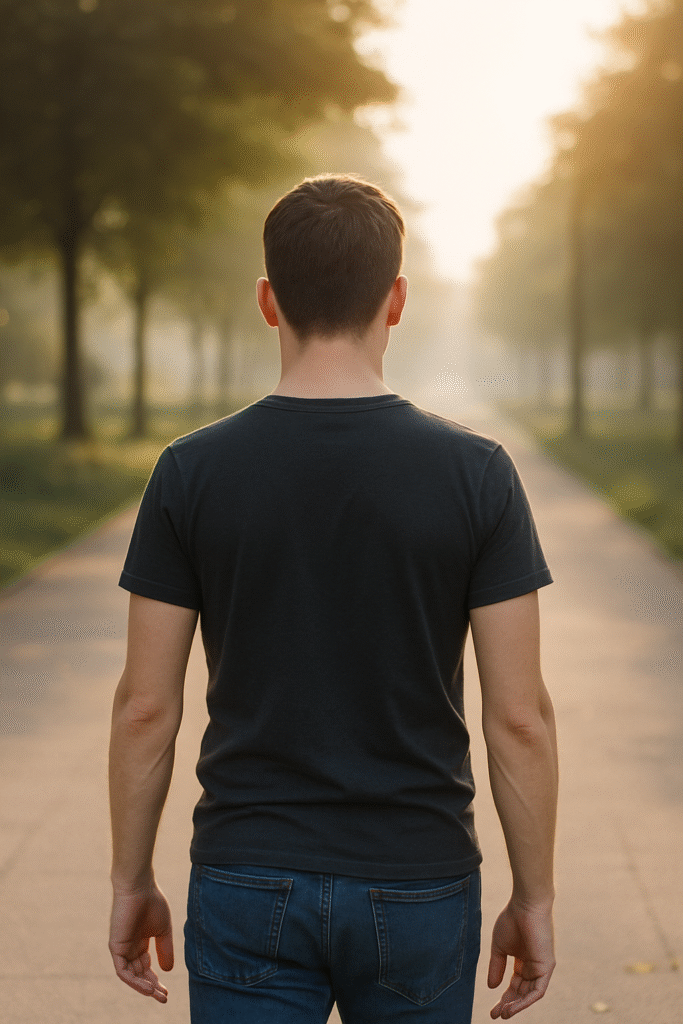
Actually it’s not 100 days sober. Just checked and it’s 111 days. Days sober are now not being counted daily in my head. I take that as a good sign. It’s becoming normal. Certainly compared to where I was.
I still remember waking up in panic, drenched in sweat, heart thumping through my chest. Thinking I’d been drinking. Smelling it in the air. Tasting stale beer that wasn’t there. That haunted me for weeks. No sickness now. No shaking. No vomiting. But I remember what that felt like — and I know some of you reading this still wake up that way. I did too. I don’t miss that. I start my day clearer, but I don’t forget.
No big speech. No miracle story here. Just where I’m at. Over 100 days sober, typing this on an unusually sunny morning here. No hangover — productive. Alive. When at my worst, I’d get Just Eat or Uber Eats delivered with alcohol. Three clicks, beer at the door. Varying shops to pretend it was normal — and failing. Those apps are gone now.
Some days feel like progress. Others are quiet. But I’m no longer in chaos. It’s far from done. But I see the changes. That alone is better than where I was.
If you’re reading this because something doesn’t feel right anymore — I’ve been there. I didn’t quit with a grand plan. I fell through every familiar stage. What’s worked? Showing up. Being consistent. Eating better. Asking for help. Getting things out instead of burying them. I’ve started routines. Learning new skills. Colleagues have said I look better. I’m not where I want to be, but I’m not where I was. And that means something.
This post isn’t a guide. It’s a snapshot. Of what’s helped. Of what’s still a battle. Of why I haven’t gone back.
What’s Changed Being 100 Days Sober
I’ve kept my job. Had hard conversations. Been in pubs and not touched a drink. Actually come to think of it in the 100 days sober I’ve been in more pubs than when I was drinking heavily alone. Always soft drinks or coffee.
I’ve started two types of counselling — and stuck with them. It’s helping. I’d always recommended it to others. I finally took that advice myself. I’ve opened up properly this time. I hear everything at work — nothing shocks me. But I had to be honest with myself too.
I’m on medication. A support, not a solution. It keeps me steady while I face what needs to be faced.
I’ve paid down some debt. Eaten better. Focused on me. Built a routine. Even managed a sober trip to Ireland over St Patrick’s Day — some achievement. Words I never thought I would type. 100 days sober included a trip to many bars sober on the biggest drinking day in the country.
Work’s going well. I’m alert, not sluggish. Two people I help are entering rehab. They don’t know I’ve lived it. They’ve told me I’m easy to talk to, not judging. That matters. I just listen. I know what can help. I’m lucky — I love my job.
Timeline Checkpoints
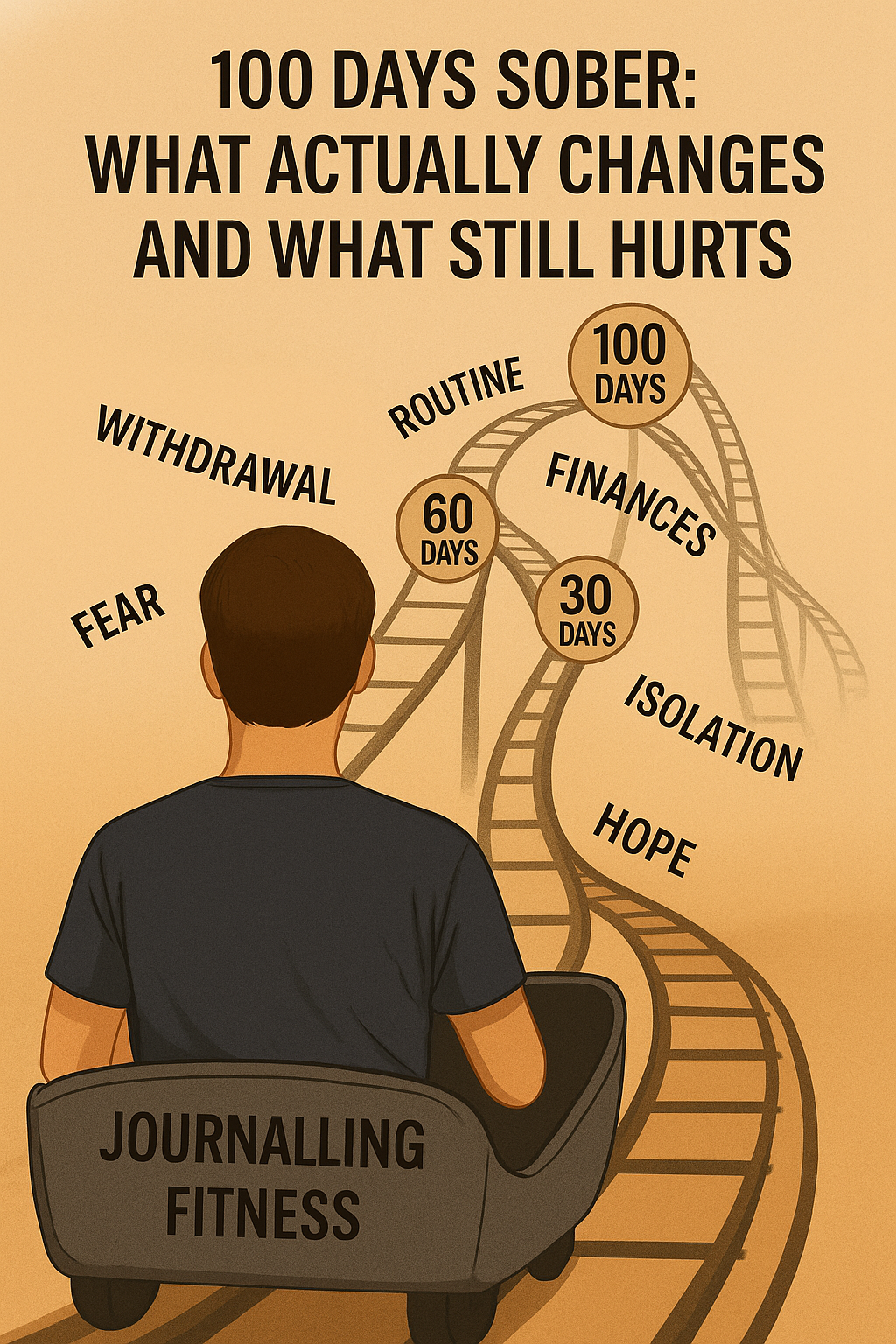
Day 1–7:
Cold turkey at home. Sweating, shaking, confusion, panic attacks. I took every supplement I had to get through it — risky and not recommended without medical advice. I’d done this before, but this time I made it stick. Emotionally, I hit a low. My body ached. My mind felt scrambled. But by the end of the week, the fog began to lift, and the soreness started to ease.
Day 8–30:
Then came the “false high” — that burst of energy where I thought I could fix everything in a week. I quickly learned this was a marathon, not a sprint.
I overhauled my diet: home-cooked soups, light meals, hydration. I stayed on the supplements and added a few more — magnesium, milk thistle, NMN, and a natural testosterone booster
Journalling became a daily tool.
AA meetings became regular — 3x a week. I started taking Naltrexone, which blocks the rewarding effects of alcohol.
Sleep finally returned. Counselling sessions began. I had weekly calls with addiction services too — vital at that stage.
Day 31–60:
My first sober night out with colleagues. Soda water and lime in a pub, no issues.
Appearance improving. Skin less grey.
Journalling went deeper.
I started opening up properly in counselling. Supplements were now a habit — a small but steady part of what kept me grounded each day.
Started working out again. Reflected on my routines and triggers. For the first time, I pictured who I wanted to be in a year — and started acting like him.
Day 61–90:
Tackled DIY jobs — something I’d always put off. I wanted my flat to finally feel like a home.
Fitness training began properly. Mood stabilised.
Started repaying debt. Liver readings improved.
And then: Ireland. Bucket list trip.
St Patrick’s Day. Guinness flowing everywhere. I walked into Irish pubs, stayed sober, ate well, laughed, remembered every moment.
No blackouts. No shame. Just good food, good company, and real memories.
Day 91–111:
Life kept testing me — I passed those tests without alcohol.
That’s when I realised: I’d changed.
Counselling deepened — digging into long-held beliefs, emotional roots and trauma.
Work improved. Focus sharper. Calm felt normal.
Still attending AA, still taking Naltrexone, still on supplements.
People said I looked healthier than even a month ago. That meant something.
Started a proper skincare routine. Self-care mattered now. Workouts got longer. Still feel isolated — but I’m improving. Not stopped vaping, but cut back. Thats the next to go.
Support Systems: AA and Helplines
AA helped most in the early days. Just sitting in a room with people who understood. I was still drinking when I went to my first meeting. They welcomed me anyway. I stopped the next day.
I don’t agree with every part. But it gave me structure. I was jumping to the end before facing the start. Talking helped. Numbers helped. Being around others — that helped.
Early on, I phoned helplines. Not in crisis. Just to not feel invisible. I don’t do that now. But it mattered then. It was the first step where I took proper initiative for myself.
The Ongoing Reality
There’s still pain. Some things that being 100 days sober do not get close to solving. I haven’t seen my daughter this year. The money’s gone to lawyers instead. Weekly messages are all I get. My ex-wife says my child doesn’t want to speak to me. I’m not sure I believe it. The texts suggest otherwise. Today she sent me a message with love hearts and kisses. I wish I had not picked up one last time.
My eldest daughter — I saw her once. It seemed to go well. Then she pulled back. She’s now in counselling. Says she’s unsure if we can have a relationship right now. That’s the cost of addiction. I hurt her. I hope she gets the support she needs. If she ever wants to talk, I’ll be the dad she wanted all along.
My ex-wife — a separate story. The biggest reason my drinking spiralled. But I won’t use that now as justification. That would be my choice — and I’m not making it.
Loneliness hits. Hard. Some nights it’s brutal. But I don’t drink over it. That matters. As a divorced dad in recovery with a quiet life — it can overwhelm. Routine, journalling, and self-care keep me anchored.
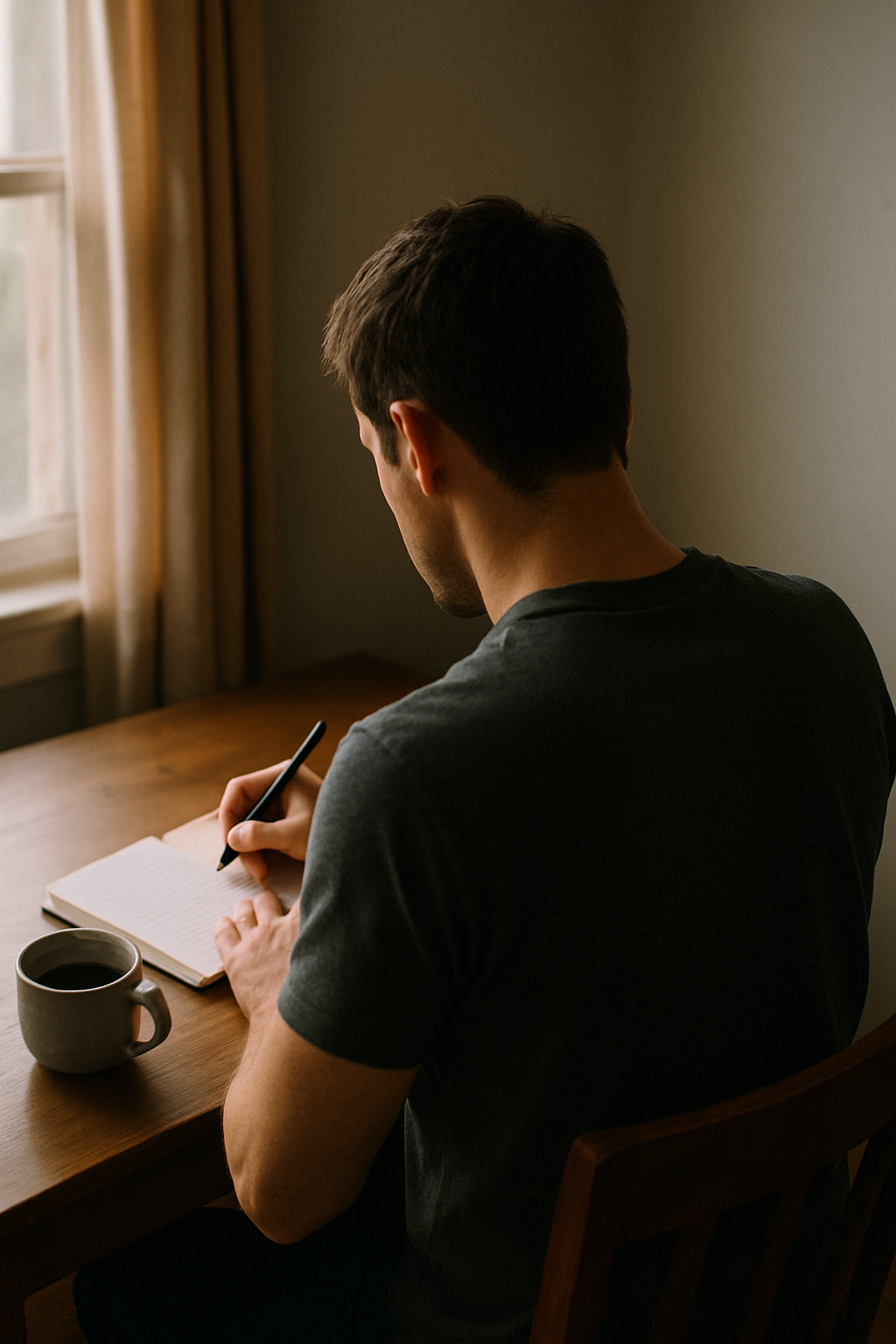
The Game-Changer: Journalling
It’s not fancy. But it’s probably the best thing I’ve done:
- It helped me spot my triggers
- It gave me accountability
- It reminded me how far I’ve come — when my mind tried to forget
I added affirmations. Simple ones. Some days felt forced, some days they felt natural. But it kept my head aligned with who I want to be. I will look back at these 100 days and realise this is the moment things changed forever.
I wrote down my future — what I want to build in a year. I started living like it was already mine.
Looking back weekly, I see how far I’ve come. I wish my daughters — and Isla — could see it. Maybe they would be surprised. Or maybe not. Three expected it from their dad. One saw the potential in her partner. I’m closer to what they wanted — without alcohol. Right now, I’m invisible. But I’m still building. It’s only 100 days sober also – I’m know I have so much to solve still.
Physical Transformation
I used to wake up sweating, heart racing, unsure what I’d done the night before. That fear shaped my mornings for years. That’s gone now. My liver readings — once high — are normal again.
I eat better. Take the supplements and medication. Sleep better. I built a basic sobriety routine: healthy breakfast, vitamins, exercise, rest. Use my time productively. Nothing flashy. But it’s helped. I feel it.
What Actually Changed
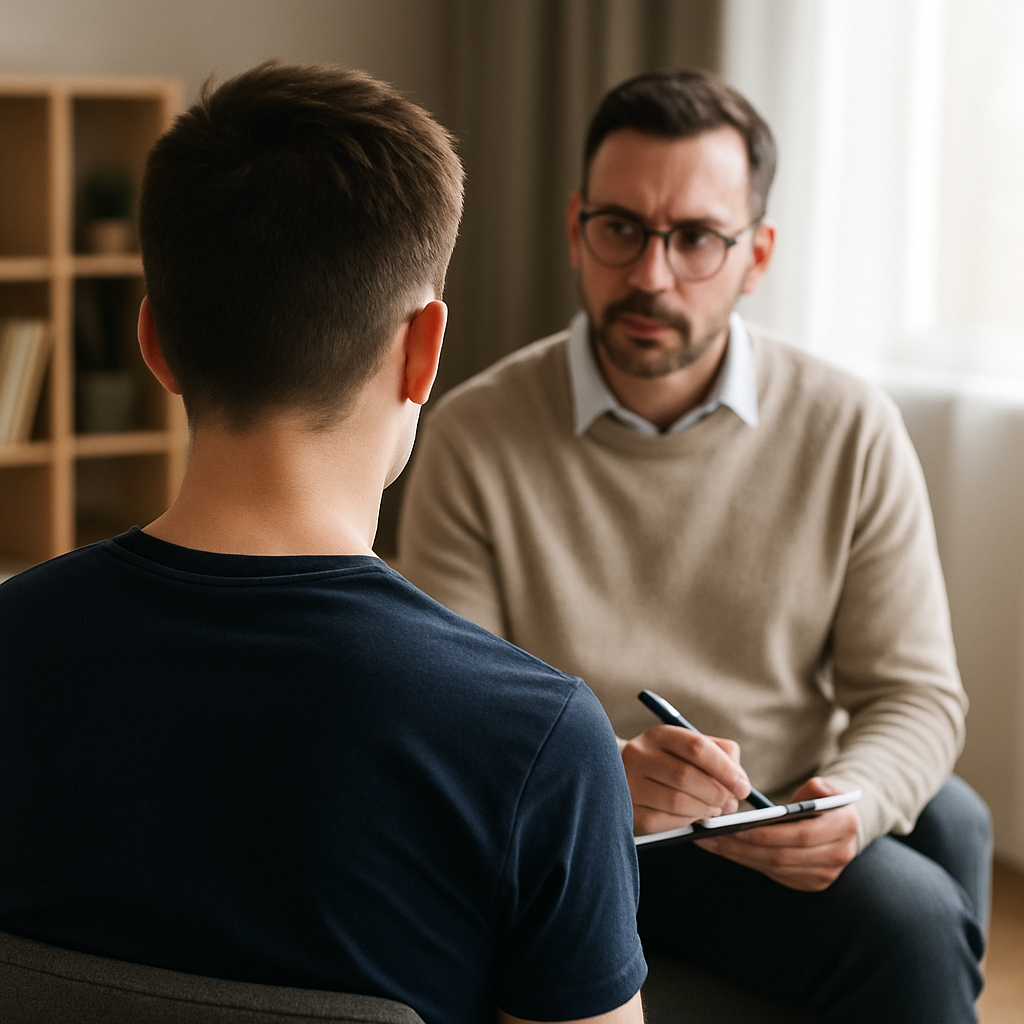
Not much — all at once anyway. Just lots of small, stacked changes. being 100 days sober has helped me forge new habits, gradually they became the normal.
I took a hard look at myself. Accepted I had a problem. No more running. I work daily to undo the damage alcohol caused.
There’s trauma I buried. I’m only now learning how much it shaped my drinking. What I thought was personality was actually protection.
If You’re Wondering If You Need to Change
Maybe you already know. In the first 100 days sober I’ve learned more about myself than ever before.
I used to Google “am I drinking too much?” in my 30s. I’d read stories and think, “That’s not me.” I wish I’d stopped typing it back then.
But here we are. And now I only focus on today — and tomorrow.
You don’t have to crash to change. Just stop pretending it’s fine. One day, you’ll know it’s not. Recovery looks different for everyone. But the truths inside it often match.
You won’t feel fixed. But you’ll feel you again. And that’s a strong place to start.
Today is day 111 of no alcohol. A year from now, I want to be dependable. Calm. Clean cut. Fit. Someone my daughters and Isla trust. Someone I’d trust too. I want to earn more, live better, and build something real — not run from something broken.
Every day I try to live in the end. To picture the man I know I can become. None of that’s possible with alcohol. I may go to a meeting later. Talk. Listen. Someone might say I look well. That’ll make the coffee taste better. That’s why day 112 will be a little better again.
Recap – What 100 Days Sober Looked Like
- I quit cold. It wasn’t smart, but it worked.
- The cravings passed. AA, journalling, counselling, and Naltrexone all helped.
- I faced hard truths. I built better routines.
- I travelled sober, worked out, and paid off debt.
- I haven’t seen my daughter yet — but I’m becoming the dad she deserved.
- I’m still building. But I’m no longer drowning.
If you’re on a similar path or want to talk recovery, feel free to contact me here.
What’s helped you so far? What’s been the hardest part? I’d genuinely like to know. If you’re going through something similar, or want to ask how I handled early recovery, feel free to reach out. You can contact me here or post a comment below.
– Grey
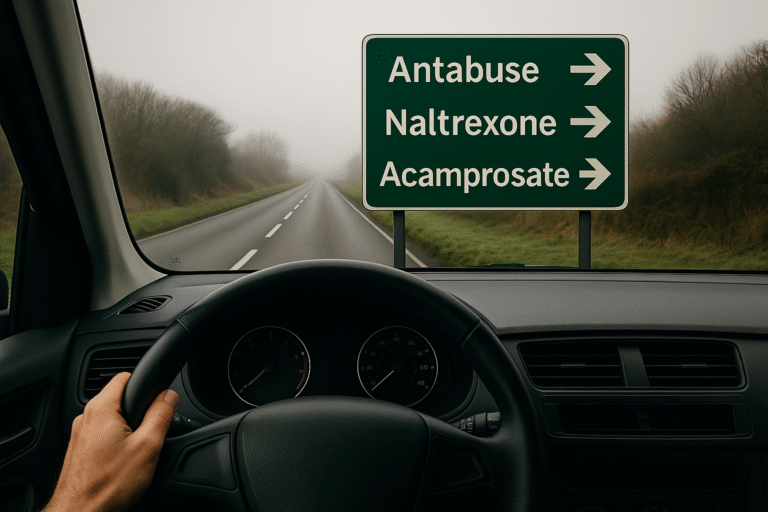
2 Comments